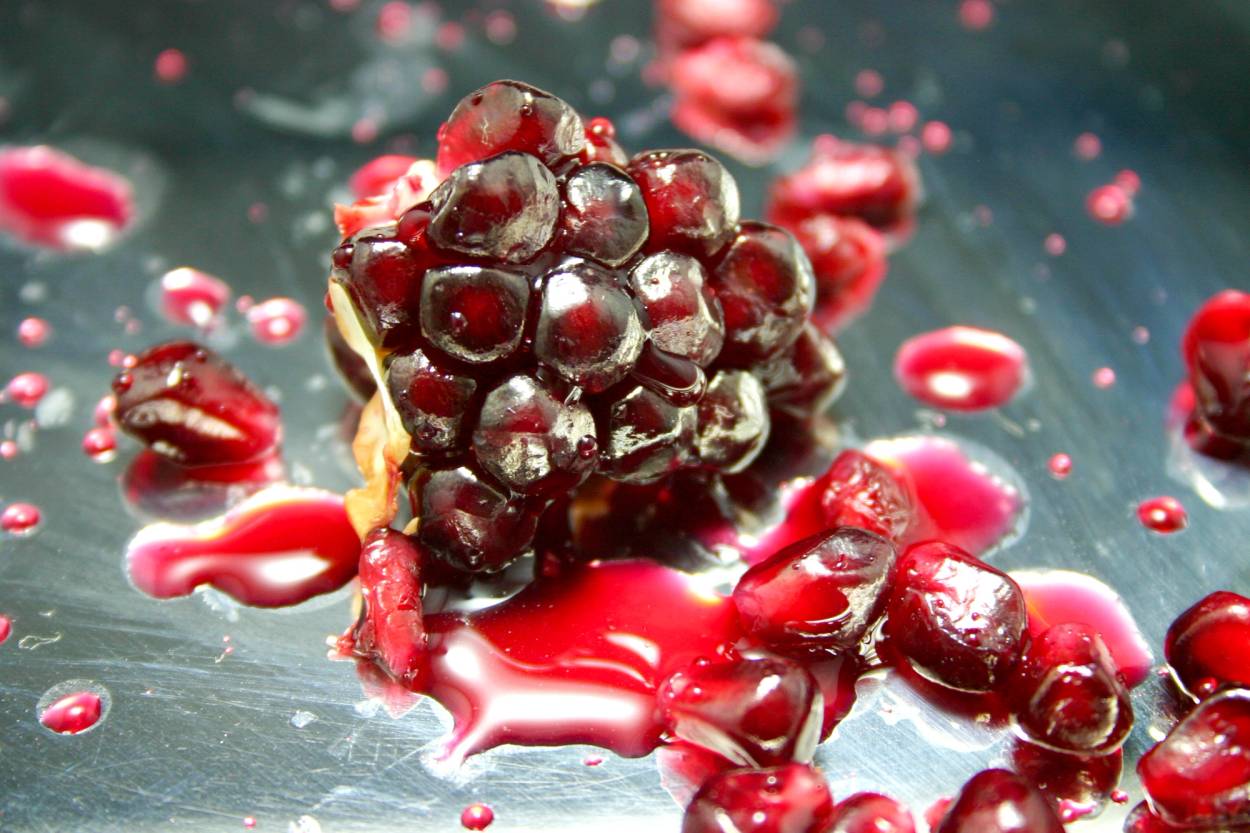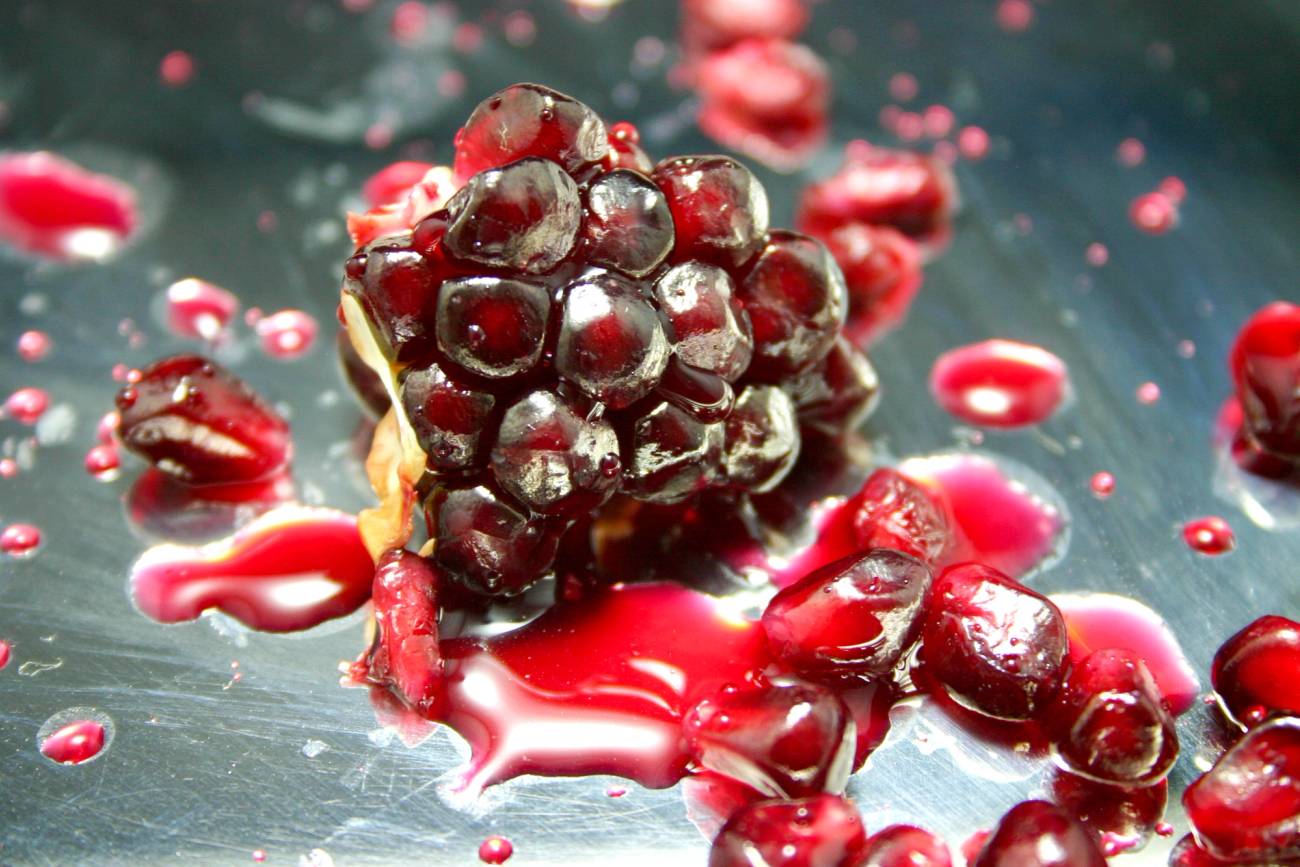The Essential Pomegranate
Even more than the fruit itself, pomegranate molasses is a must-have for modern Middle Eastern cooking




Pomegranates have been a popular food since the beginning of time: Some scholars believe that Eve was tempted in the Garden of Eden by a pomegranate rather than an apple. Originating in what is now Iran, the fruit has been cultivated in the Middle East, the Mediterranean, and Southeast Asia for millennia. It is mentioned in the Bible; in Song of Songs, the pomegranate was considered a symbol of love, so much so that Temple priests adorned their robes with images of the fruit. In the Quran, the Prophet Muhammad recommended eating pomegranates as an antidote to hatred and anger.
Ancient Egyptians were often buried with a pomegranate, to provide the deceased with food for the afterlife. In ancient Greece, it was a symbol of female fertility as well as the loss of virginity—because of its red stains and abundant seeds. (Greek legend has it that the first pomegranate tree was planted by Aphrodite, the goddess of love.) In Jewish tradition the pomegranate is a symbol of fruitfulness, righteousness, knowledge, and wisdom, probably because it is said to have 613 seeds—the same number as the miztvot (commandments) in the Torah. There is also a saying in the Torah: “Even the empty-headed ones are full of good deeds as a pomegranate is full of seeds.”
Pomegranates have long been used in medicine, too. In the Middle Ages pomegranates were often prescribed for coughs, to stimulate the appetite, and as an aphrodisiac; rubbing pomegranates on the feet was also thought to help stop them swelling during pregnancy. One medieval Italo-Jewish rabbi, Shabetthai Donnolo, prescribed mixing pomegranate juice with wine to use as a gargle. He also recommended pouring a mixture of dried pomegranates and water into the ear, to treat earaches.
The popularity of the pomegranate endures to this day, particularly among Jews. It has appeared on coins in modern-day Israel, just as it did in ancient Judea.
But in modern Middle Eastern and Near Eastern cooking, pomegranate molasses is even more essential than the fruit. It is much loved in Israel, where it is used to flavor a variety of mezze, especially muhammara (a sweet pepper and walnut dip), baba ghanoush (the well-known eggplant and tahini dip), and bazargan (a spicy bulgur salad with walnuts, pine nuts, and mint). Iranian Jews are especially fond of fessenjan—roast chicken simmered in spicy walnut and pomegranate sauce.
In biblical times pomegranates were usually eaten fresh or used to make juice. The seeds were also dried in the sun and used whole or ground to flavor soups, stews, legumes, vegetable dishes, and chutneys, especially in the Near East and India. Another way to preserve the fruit was to boil the juice down to a light syrup, dilute it with water, and then serve it as a beverage. The juice could also be boiled down further, until it had the consistency of dark molasses with a rich, sweet-sour flavor. Traditionally pomegranate molasses—called dibs rumman or rub al-rumman in Arabic or nar eksisi in Turkish, and known as narsharab in Persia, Georgia, and Azerbaijan—was made with sweet or sour pomegranates, but today sugar or lemon juice is often added to adjust the flavor. Pomegranate molasses can be made in various thicknesses, so you may need to adapt the quantity used in a recipe according to its thickness. Generally, the thicker the molasses the stronger the taste, so you may need less if the molasses is very thick.
Pomegranate molasses can be used in myriad ways. It gives a delicious tang to salad dressings and marinades. You can brush it over roast vegetables—especially carrots, butternut squash, eggplant, and cauliflower—or stir a little into a bowl of hummus. In Turkey it is often used to flavor kisir—a bulgur salad made with tomato paste, pomegranate molasses, olive oil, lemon juice, and fresh mint. It can also be used in desserts, especially as a drizzle over ice cream or strained yogurt, or you can add a tablespoon to sparkling water or iced tea to make a refreshing drink.
Not only is pomegranate molasses a welcome addition to your kitchen, it is also good for your health. It is rich in B vitamins and vitamin C, as well as polyphenol antioxidants that may boost your immune system, lower your cholesterol, help you maintain a healthy digestive system, and even reduce the risk of some cancers.
You can find pomegranate molasses in most Middle Eastern specialty stores or online. I like to use pomegranate molasses that is made with concentrated pomegranate juice—without any sugar, lemon juice, artificial colorings, flavorings, or preservatives. It should have a rich, dark color and a smooth thick, consistency. Alternatively, it can be easily made at home.
Paola Gavin is a food writer and author of four vegetarian cookbooks including Hazana: Jewish Vegetarian Cooking. Follow her on Instagram @paolagavin and on Twitter @paolagavinfood.